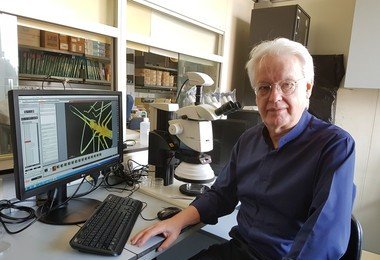KE Spotlight
Filter
-

International study reveals 82% of core ecological processes compromised by climate change
An international study led by University of Florida, with participation from the HKU School of Biological Science, revealed that 82% of the 94 identified ecological processes have been compromised by climate change. Land, freshwater and marine ecosystems and species have all been all affected, and consequential impacts on people could range from increased pests and disease outbreaks, to unpredictable changes in fisheries and decreasing agriculture yields. Co-author Professor David Dudgeon, Director of the School of Biological Sciences, warned that local species like paradise fish, short-legged toad and Hong Kong newt are at risk as habitats shrink. The research team hopes the research could steer governments in the right direction and deliver the message that climate change is not just a projection and that the effects on ecological processes are already happening. The study was published in the prestigious journal Science.
Read More -
Knowledge Exchange Awards 2016
The annual Faculty Knowledge Exchange (KE) Awards recognize each Faculty's outstanding KE accomplishment that has made demonstrable economic, social or cultural impacts to benefit the community, business/industry, or partner organizations. The KE Award (Non-Faculty Unit) was introduced with the same objective for the independent centres, institutes and units of the University. Results of the 2016 KE Awards are now available.
Read More -

HKU chemists achieve breakthrough in antibacterial drug development
Dr Li Xuechen of the HKU Department of Chemistry and his research team, together with collaborators in the University of Central Florida and PolyU, reported in Nature Communications their studies on the synthesis of a newly discovered antibiotic Teixobactin, which can kill a range of pathogens without detectable resistance. The discovery underlies potential application and development of the next-generation teixobactin-based antibacterial drugs. The team was one of the fastest groups in the world to complete the chemical synthesis of teixobactin, from which they have also generated 10 teixobactin analogues with US provisional patent filed.
Read More -

New ant species Paratopula bauhinia (Golden Tree Ant) described and named by HKU biologists
The Insect Biodiversity and Biogeography research group led by Dr Benoit Guénard at the HKU School of Biological Sciences has described and named a new species of ant from Hong Kong, Paratopula bauhinia, or the rare "Golden Tree Ant", in academic journal "Asian Myrmecology". This new ant species was found just a few hundred meters from HKU campus on the foothill of Lung Fu Shan Country Park during a night field course by Ms Ying Luo, a research assistant with the School of Biological Sciences. The ant is about 7mm long and golden in appearance. The new ant represents the 22nd ant species described from Hong Kong since 1858. The last one was in 2000. Descriptions of earlier species had to be dated back to 1928.
Read More -

HKU biological scientist Professor Nagendra Shah wins International Dairy Foods Association (USA) award
Professor Nagendra Shah, Professor of Food Science and Technology of the HKU School of Biological Sciences, was earlier named the recipient for the International Dairy Foods Association Research Award in Dairy Foods Processing in 2016 by the American Dairy Science Association. He has made outstanding contributions to the Australian and international dairy industries over the past 35 years. His team has also developed rapid and reliable techniques to detect and quantify pathogens in milk powder. A pioneering work by Professor Shah leading to this award has been on γ-aminobutyric acid (GABA) producing lactic acid bacteria. GABA is a non-protein amino acid that has shown anti-hypertensive (blood pressure lowering) effect, but most high GABA producers are bacteria of plant origin, which are not able to grow in milk. Professor Shah's research team has shown that with the help of bacteria native to milk, bacteria of plant origin could synthesize GABA in milk. This groundbreaking work has great commercial significance in developing dairy foods with GABA for anti-hypertensive activity.
Read More -

HKU study reveals endocrine disruptors in samples of 11 seafood species
HKU Faculty of Science conducted a study on endocrine disruptors including triphenyltin in the environment from 2010 to 2015. Seafood samples collected in local water and bought in wet markets, sea water samples from four marine parks and reserves and nearby wastewater treatment plants, and sea mud and marine animals were tested. Samples of all eleven seafood species originating in HK water tested positive for triphenyltin (TPT). The TPT level found in the sample of flatfish sole exceeded the safety standards. Mussels collected from marine parks also contained a number of endocrine disruptors including estrogen hormones used in contraceptives. According to Dr Kevin Ho, researcher of the HKU Swire Institute of Marine Science, the TPT content in flatfish sole was 3.5 times higher than Taiwan’s, TPT content in shellfish was 120 times that of Korea’s, indicating the seriousness of the water pollution problem here. Associate Dean of Science Professor Kenneth Leung Mei-yee said long term consumption of contaminated seafood could affect human endocrine and immunity systems and cause health problems.
Read More -

HKU Swire Institute of Marine Science presents exhibition "Corals: Our Underwater Living Treasures"
Conservation International Hong Kong, Hong Kong Maritime Museum and HKU Swire Institute of Marine Science (SWIMS) jointly present an exhibition, "Corals: Our Underwater Living Treasures", which will run from June 8 to September 18 at Hong Kong Maritime Museum – Central Pier No. 8. The exhibition aims to educate and inspire the public about the extraordinary wealth of corals in Hong Kong and Asia Pacific region, featuring the science and benefits of, threats to, and solutions facing corals in Hong Kong and the "Coral Triangle" in Southeast Asia. Hong Kong has 84 hard coral species and 26 soft coral species, more than the entire Caribbean Sea. This exhibition will include several samples of coral species. There will also be public lectures by coral experts and family workshops.
Read More

